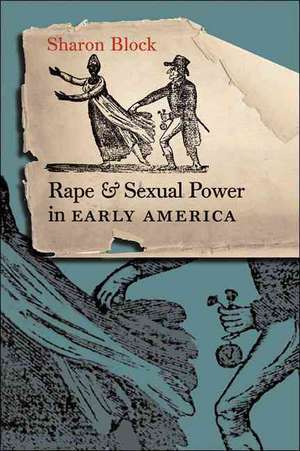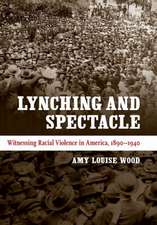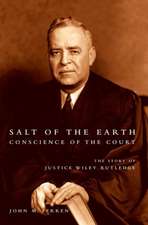Rape and Sexual Power in Early America: Published for the Omohundro Institute of Early American History and Culture, Williamsburg, Virginia
Autor Sharon Blocken Limba Engleză Paperback – 3 sep 2006
Block analyzes the legal, social, and cultural implications of more than nine hundred documented incidents of sexual coercion and hundreds more extralegal commentaries found in almanacs, newspapers, broadsides, and other print and manuscript sources. Highlighting the gap between reports of coerced sex and incidents that were publicly classified as rape, Block demonstrates that public definitions of rape were based less on what actually happened than on who was involved. She challenges conventional narratives that claim sexual relations between white women and black men became racially charged only in the late nineteenth century. Her analysis extends racial ties to rape back into the colonial period and beyond the boundaries of the southern slave-labor system. Early Americans' treatment of rape, Block argues, both enacted and helped to sustain the social, racial, gender, and political hierarchies of a New World and a new nation.
Din seria Published for the Omohundro Institute of Early American History and Culture, Williamsburg, Virginia
-
 Preț: 265.42 lei
Preț: 265.42 lei - 15%
 Preț: 666.29 lei
Preț: 666.29 lei -
 Preț: 432.77 lei
Preț: 432.77 lei -
 Preț: 474.24 lei
Preț: 474.24 lei -
 Preț: 288.50 lei
Preț: 288.50 lei - 15%
 Preț: 485.48 lei
Preț: 485.48 lei -
 Preț: 390.14 lei
Preț: 390.14 lei -
 Preț: 351.67 lei
Preț: 351.67 lei -
 Preț: 344.76 lei
Preț: 344.76 lei -
 Preț: 335.82 lei
Preț: 335.82 lei -
 Preț: 313.45 lei
Preț: 313.45 lei -
 Preț: 343.39 lei
Preț: 343.39 lei -
 Preț: 305.77 lei
Preț: 305.77 lei -
 Preț: 314.43 lei
Preț: 314.43 lei -
 Preț: 336.09 lei
Preț: 336.09 lei -
 Preț: 303.27 lei
Preț: 303.27 lei -
 Preț: 335.82 lei
Preț: 335.82 lei -
 Preț: 488.18 lei
Preț: 488.18 lei -
 Preț: 403.21 lei
Preț: 403.21 lei -
 Preț: 305.77 lei
Preț: 305.77 lei -
 Preț: 313.82 lei
Preț: 313.82 lei -
 Preț: 214.31 lei
Preț: 214.31 lei -
 Preț: 421.12 lei
Preț: 421.12 lei -
 Preț: 312.90 lei
Preț: 312.90 lei -
 Preț: 395.31 lei
Preț: 395.31 lei -
 Preț: 300.55 lei
Preț: 300.55 lei -
 Preț: 311.17 lei
Preț: 311.17 lei -
 Preț: 361.89 lei
Preț: 361.89 lei -
 Preț: 308.66 lei
Preț: 308.66 lei -
 Preț: 306.75 lei
Preț: 306.75 lei -
 Preț: 309.41 lei
Preț: 309.41 lei -
 Preț: 329.12 lei
Preț: 329.12 lei -
 Preț: 399.29 lei
Preț: 399.29 lei -
 Preț: 336.80 lei
Preț: 336.80 lei -
 Preț: 348.40 lei
Preț: 348.40 lei -
 Preț: 332.94 lei
Preț: 332.94 lei -
 Preț: 269.24 lei
Preț: 269.24 lei -
 Preț: 326.03 lei
Preț: 326.03 lei
Preț: 234.71 lei
Nou
Puncte Express: 352
Preț estimativ în valută:
44.92€ • 46.72$ • 37.65£
44.92€ • 46.72$ • 37.65£
Carte tipărită la comandă
Livrare economică 13-27 martie
Preluare comenzi: 021 569.72.76
Specificații
ISBN-13: 9780807857618
ISBN-10: 0807857610
Pagini: 276
Dimensiuni: 232 x 159 x 18 mm
Greutate: 0.45 kg
Editura: University of North Carolina Press
Seria Published for the Omohundro Institute of Early American History and Culture, Williamsburg, Virginia
ISBN-10: 0807857610
Pagini: 276
Dimensiuni: 232 x 159 x 18 mm
Greutate: 0.45 kg
Editura: University of North Carolina Press
Seria Published for the Omohundro Institute of Early American History and Culture, Williamsburg, Virginia
Textul de pe ultima copertă
In a comprehensive examination of rape and its prosecution in British America between 1700 and 1820, Block analyzes the legal, social, and cultural implications of more than nine hundred documented incidents of sexual coercion and hundreds more extralegal commentaries found in almanacs, newspapers, broadsides, and other print and manuscript sources. She demonstrates that public definitions of rape were based less on what actually happened than on who was involved. Early Americans' treatment of rape, she argues, both enacted and helped to sustain the social, racial, gender, and political hierarchies of a New World and a new nation. In a comprehensive examination of rape and its prosecution in British America between 1700 and 1820, Block analyzes the legal, social, and cultural implications of more than nine hundred documented incidents of sexual coercion and hundreds more extralegal commentaries found in almanacs, newspapers, broadsides, and other print and manuscript sources. She demonstrates that public definitions of rape were based less on what actually happened than on who was involved. Early Americans' treatment of rape, she argues, both enacted and helped to sustain the social, racial, gender, and political hierarchies of a New World and a new nation.
Notă biografică
Sharon Block is associate professor of history at the University of California, Irvine.















